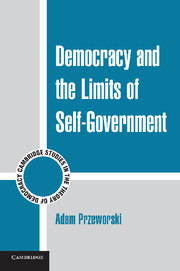Book contents
4 - Equality
Published online by Cambridge University Press: 05 June 2012
Summary
INTRODUCTION
For a collectivity to govern itself, all of its members must be able to exercise equal influence over its decisions. No individual or group can be favored because of some traits they have.
This condition is not as obvious as it may appear. Note first that the definition of equality does not assume a duty to participate. Nevertheless, it does require that (1) all members must have an effectively equal opportunity to participate and (2) if they participate, their preferences must have the same weight. “Effectively equal opportunity” is not the same as “the right to.” I am weary of the language of rights: An effectively equal opportunity entails not just rights but also conditions, some minimal material and intellectual conditions, “decent wages and reading.” Furthermore, even if everyone has the minimal conditions, individual conditions may still be unequal. Hence, for political influence to be equal in an unequal society, the inequality of conditions cannot be transformable into inequality of influence.
Thus defined, equality is not equivalent to anonymity. Anonymity means only that democratic citizens are not distinguished qua citizens by any traits, including the traits that reveal them as unequal. One can say “a wealthy man” or a “handsome man,” but not a wealthy or handsome citizen. All individual qualities are left at the doorstep of democratic politics; they are irrelevant for the status of citizens. But this means only that anonymity is a veil over the inequality that exists in society.
- Type
- Chapter
- Information
- Democracy and the Limits of Self-Government , pp. 66 - 98Publisher: Cambridge University PressPrint publication year: 2010



